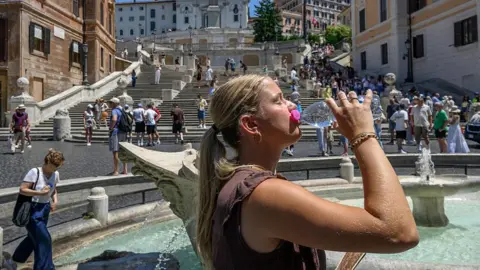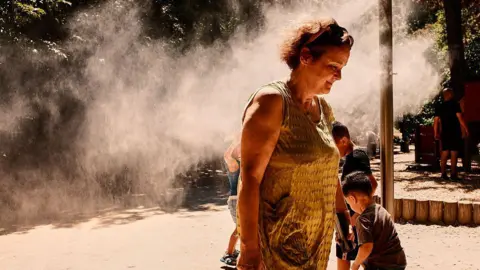Scorching European heatwave turns deadly in Spain, Italy and France
 Getty Images
Getty ImagesA wildfire in Spain and high temperatures elsewhere in Europe have claimed another six lives as the continent swelters in temperatures topping 40C.
Two farmers died when they became trapped by flames near the town of Coscó in Spain's Catalonia region. Authorities said a farm worker had appealed to his boss for help, but they were unable to escape as fire spread over a large area.
In Italy, two men died after becoming unwell on beaches on the island of Sardinia, and a man in his 80s died of heart failure, after walking into a hospital in Genoa.
A 10-year-old American girl collapsed and died while visiting the Palace of Versailles south-west of Paris , reports said.
According to French broadcaster TF1, she collapsed at the courtyard of the royal estate, in front of her parents, at around 18:00 local time on Tuesday. Despite efforts by the castle's security team and emergency services, she was pronounced dead an hour later.
France's ecological transition minister Agnès Pannier-Runacher said earlier that two heat-related fatalities had been recorded in France and that more than 300 people had been given emergency care.
The European continent is experiencing extremely high temperatures, a phenomenon that the UN's climate agency said is becoming more frequent due to "human-induced climate change".
Both Spain and England had their hottest June since records began. Spain's weather service, Aemet, said last month's average temperature of 23.6C (74.5F) "pulverised records", surpassing the normal average for July and August.
The two men who died in the fire in Catalonia were identified later as the farmer owner and a worker aged 32 and 45.
Emergency services said the fire had spread to an area of up to 6,500 hectares.
Aemet forecast temperatures of 41C in the southern city of Córdoba on Wednesday, and said overnight temperatures were as high as 28C in the nearby town of Osuna the night before.
France has registered its second-hottest June since records began in 1900. June 2023 was hotter.
Four departments in France remained on the red alert level for heat on Wednesday, the highest level. These include Aube, Cher, Loiret and Yonne, according to Météo-France.
 Getty Images
Getty ImagesIn Sardinia, where temperatures have exceeded 40C in recent days, a 75-year-old man died after falling ill on a beach in Budoni. Another man, 60, became sick while on the beach of Lu Impostu in San Teodoro.
Two construction workers in the Italian province of Vicenza were rushed to hospital at 15:30 local time on Tuesday because they fell ill as a result of the heat while working in a hole. One of the workers is in a coma, according to the Ansa news agency.
Meanwhile two wildfires have prompted emergency evacuations in Greece, as authorities warn of a very high fire risk across many regions, including Attica, Crete, and parts of the Peloponnese and Aegean islands.
In the northern Halkidiki region, a fast-moving blaze near the coastal village of Vourvourou burned through highly flammable pine forest, forcing residents and campers to flee. Power cuts have been reported in the area, while 65 firefighters, ground teams, and aerial units are battling the flames in steep terrain.
On the island of Crete, a large fire was burning out of control near the seaside village of Achlia, threatening homes, tourist accommodation and critical infrastructure. Local residents and tourists have been ordered to leave. More than 100 firefighters have been deployed to tackle the blaze.
Dimple Rana, heat and microclimate specialist at sustainable development consultancy Arup, told the BBC there was "a big link between heat-related impact and age".
In the UK, for example, most heat-related deaths were among older adults, Ms Rana said. Younger children, particularly those under five, were also at risk.
Another factor to consider is that often people on lower incomes undertake more manual work, Ms Rana said, meaning they are more exposed to higher temperatures.
Heatwaves are becoming more common due to human-caused climate change, according to the UN's Intergovernmental Panel on Climate Change.
Extreme hot weather will happen more often - and become even more intense - as the planet continues to warm, it has said.
The World Meteorological Organization (WMO), which is the UN's weather and climate agency, said on Tuesday that human-induced climate change meant "extreme heat is becoming more frequent and intense".
In a statement, the WMO added: "The effect of heat on human health is more pronounced in cities as a result of the urban heat island effect.
"This is where urban environments are significantly warmer than surrounding rural areas, especially during hot periods, due to an abundance of paved surfaces, buildings, vehicles, and heat sources."
"This additional heat in cities exacerbates heat stress and can increase mortality during hot periods," the agency said.
